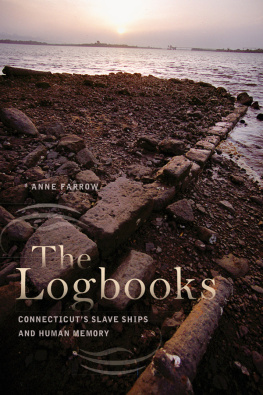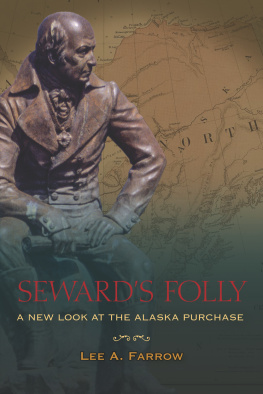
The Logbooks
A DRIFTLESS CONNECTICUT SERIES BOOK
This book is a 2014 selection in the Driftless Connecticut Series, for an outstanding book in any field on a Connecticut topic or written by a Connecticut author.
ALSO BY ANNE FARROW
Complicity: How the North Promoted, Prolonged, and Profited from Slavery (2005; with Joel Lang & Jenifer Frank)

WESLEYAN UNIVERSITY PRESS
MIDDLETOWN, CONNECTICUT
ANNE FARROW
The Logbooks
CONNECTICUTS SLAVE SHIPS AND HUMAN MEMORY

Wesleyan University Press
Middletown CT 06459
www.wesleyan.edu/wespress
2014 Anne Farrow
All rights reserved
Manufactured in the United States of America
Designed by Eric M. Brooks
Typeset in Monotype Bell by Passumpsic Publishing
Wesleyan University Press is a member of the Green Press Initiative. The paper used in this book meets their minimum requirement for recycled paper.
The Driftless Connecticut Series is funded by the Beatrice Fox Auerbach Foundation Fund at the Hartford Foundation for Public Giving.
Library of Congress Cataloging-in-Publication Data available upon request
5 4 3 2 1
Cover photograph: The jetty at Bence Island, by Thomas Brown/Hartford Courant. For thousands of African people, walking this gravel path was their last moment on African soil.
FOR STEPHEN,
who has a verdant heart
Preface
Why are you doing this? my friend asked.
I looked at her lean brown face, lit by the glass lamps suspended over our restaurant table, and made what I did not recognize, then, as an excuse.
New Englands relationship with slavery is a great story, I said. Were journalists; were supposed to uncover stories of wrong and injustice. I made my argument, or, as we called it in the newsroom, my pitch.
Liz looked at me for a long moment with the level, answering gaze I knew from having had her edit my stories at the newspaper.
Thats not it, she said. When white people take up black stuff, theres always a reason. Theres always something there.
I told her that I needed engaging work, having recently broken up with my longtime boyfriend. Studying my countrys tortured relationship with slavery and race prejudice made my own life, with its varied griefs and money worries, seem small.
She smiled at me as if to say, thats not it, and picked up her menu.
Truthfully, I had not thought about why I was researching the history of slavery in America until my friend asked me. The work had begun as an assignment for the Sunday magazine of the newspaper where I worked, and then deepened into a book coauthored with two colleagues. But always, I worked at the direction of others.
Three years into the work and engaged by it without ever knowing why, I found the raw material of New England slaveholding so gripping that I didnt pause to ask. The stories of the captives pulled me forward and then cracked my heart, and they were everywherein newspapers, court records, diaries, and census lists. A six-year-old girl with an African name whose owners were questioned after she died of a beating. An advertisement for a runaway black man who fled with a coarse brown coat and his violin. A man who wanted to sell his slave because she would not stop weeping.
I wanted to protect them, but could do nothing for them except continue my research, and write about what I was finding.
I began to read about memory, and learned that Sigmund Freud believed the unconscious self never lies. That it cannot lie. And then I saw my parents. My father, a civil rights lawyer, had died several years earlier, at eighty-seven, and my mother had been diagnosed with dementia six months after his death. Neat in the London Fog raincoat he had bought her, she held my hand in a Stop and Shop parking lot the week after his death and asked, softly, Am I alive? I looked at her and felt an absolute responsibility settle onto me. I caressed her arm and thought, but did not say, you will forget me.
From that October day, she lived seven years, dying just a few days after the anniversary of Dads death.
I expected her to become helpless, and she did. What I did not expect was that by the time she died in my arms on a rainy fall afternoon, she would teach me about the workings of human memory. In watching her memory fade and then unravel, I learned that there is a core of memories that remains yet is altered profoundly by time and the progression of the disease.
I couldnt avoid the contrast between what was happening to my mothers memory and the historical memory I was studying, which seemed so fractured and incomplete.
New Englands memories of its relationship with enslavement had the quality of fortified recollection. Yes, there were slaves, I read, but they were treated more as family members. There were slaves in New England, but not that many. Slavery was not profitable for New Englanders because we didnt grow cotton. New England had very little to do with American slavery except ending it.
These were the assumptions most frequently expressed to me, even though numerous historians over the past half century have explored the killing realities of New England enslavement. Despite the work of these scholars, the benign and cherished myths are still held close. The popular narrative hasnt changed. Henry Louis Gates Jr. says that America has a kind of amnesia around the story of American enslavement. Weve forgotten our history, then forgotten that we forgot it. Slavery is not the book that we know we own but cant find; we dont even know its on our shelves. This is a book tucked behind other books, and we cant see it.
We will always want to present ourselves in the best light, to say that a black man wasnt hired because no black men applied, or to maintain that Northerners didnt have slaves because we didnt grow cotton. We want to do right, but its hard, and we may not succeed. Why not stick with the story we already have? The one thats already in the books?
Yet we are responsible to the truth as it was lived in earlier centuries.
Dori Laub, the great scholar of Holocaust remembrance, says that we have to know our buried truths in order to live our lives. None of us is free if we keep silent.
I believe that Americans still do not have a shared and meaningful body of knowledge about a labor system here that held millions in bondage. Why we do not has become the question at the center of my life. How did historical memory eclipse the extensive information about slaves and slavery that survives in the nations vast repository of early documents? The hard question of how a post-Enlightenment nation founded on principles of personal liberty became the largest holder of slaves in the Western world is still before us, still waiting to be answered.
We need to try to find that whole history so that we can become a whole nation, one in which knowledge of the long story of people from Africa can begin to transform this country into a place of greater equality.
The answer to my friends good question is that I am doing this because I find I cannot turn away from it. I am doing this because the lives of my father and mother led me here, to this history and to its exploration. I remember them and I remember Pegg, the enslaved woman who could not stop weeping.
Next page










